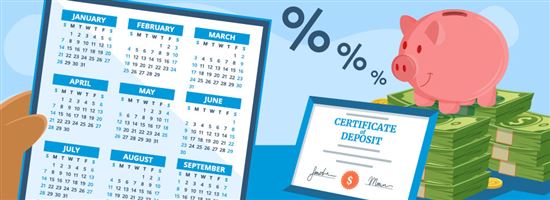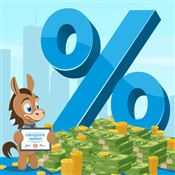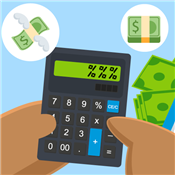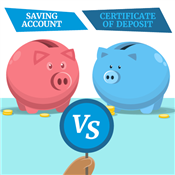Best 9 Month CD Rates for April 2024
Ad Disclosure: This article contains references to products from our partners. We may receive compensation if you apply or shop through links in our content. You help support CreditDonkey by using our links.
Lock in high APY with 9-month CDs. Find out who has the best 9-month CD rates today.
 |
- Western Alliance Bank:
9-Month High-Yield CD - 5.15% APY - First Financial Northwest Bank:
9-Month High-Yield CD - 5.00% APY - Freedom Bank:
9-Month High-Yield CD - 4.95% APY - Idabel National Bank:
9-Month High-Yield CD - 4.80% APY - Prism Bank:
9-Month High-Yield CD - 4.25% APY - The State Exchange Bank:
9-Month High-Yield CD - 3.50% APY - Ponce Bank:
9-Month High-Yield CD - 3.00% APY
If you're looking to save money for a few months and earn a good interest rate, consider 9-month CDs. Many online banks and credit unions out there offer competitive rates.
Since it is a relatively short-term commitment, you can access your funds earlier while helping you control your spending. With that, let's explore the current 9-month CD rates and determine whether it is worth it.
9-Month High-Yield CD - 5.15% APY
- No fees
- $1 minimum deposit
- 24/7 online access
- FDIC insured
- Minimum Deposit to Open: $1
9-Month High-Yield CD - 4.80% APY
- No fees
- $1 minimum deposit
- 24/7 online access to funds
- Federally insured by NCUA
- Minimum Deposit to Open: $1
9-Month High-Yield CD - 5.00% APY
- $1 minimum deposit
- No fees
- 24/7 online access to funds
- FDIC insured
- Minimum Deposit to Open: $1
9-Month High-Yield CD - 4.95% APY
- $1 minimum deposit
- No fees
- 24/7 online access to funds
- FDIC insured
- Minimum Deposit to Open: $1
9-Month High-Yield CD - 4.25% APY
- $1 minimum deposit
- No fees
- 24/7 online access to funds
- FDIC insured
- Minimum Deposit to Open: $1
What Is a 9-Month CD?
A 9-month CD or certificate of deposit is a savings account that holds a fixed amount of money for a fixed term of nine months. In exchange, you get a fixed rate that applies for the whole term which is typically higher than a regular savings account.
One of the highest rates on a 9-month CD is Western Alliance Bank:
How Do 9-Month CDs Work?
Typically, you can't take money out of a CD for 9 months once you've put it in. It's like making a deal to keep your money in there for that time. This is why banks can give higher rates on CDs than regular savings accounts where you have convenient access to your money.
However, if you withdraw prematurely, you might face penalties that can go up to 90 days' worth of interest.
How Much Does a 9-Month CD Pay?
If you put $1,000 in a 9-month CD with a 5% APY, you'll get about $37 once the term ends. Your earnings will depend on the interest rate and the amount you put in.
Here's a table to show how much you can earn on a 9-month CD.
| Rate | $1,000 | $2,000 | $5,000 | $10,000 |
|---|---|---|---|---|
| 0.00% | $1,000 | $2,000 | $5,000 | $10,000 |
| 0.50% | $1,004 | $2,007 | $5,019 | $10,037 |
| 1.00% | $1,007 | $2,015 | $5,037 | $10,075 |
| 1.50% | $1,011 | $2,022 | $5,056 | $10,112 |
| 2.00% | $1,015 | $2,030 | $5,075 | $10,150 |
| 2.50% | $1,019 | $2,037 | $5,093 | $10,187 |
| 3.00% | $1,022 | $2,045 | $5,112 | $10,224 |
| 3.50% | $1,026 | $2,052 | $5,131 | $10,261 |
| 4.00% | $1,030 | $2,060 | $5,149 | $10,299 |
| 4.50% | $1,034 | $2,067 | $5,168 | $10,336 |
| 5.00% | $1,037 | $2,075 | $5,186 | $10,373 |
| 5.50% | $1,041 | $2,082 | $5,205 | $10,410 |
Check out this convenient CD calculator to test other rates and amounts with 9-month CDs.
Earning interest on a 9-month CD isn't very different from traditional savings accounts. Though for CDs, your money will earn interest with a fixed rate over the fixed 9-month term, meaning your rate will not change at all until maturity. Compound interest can also apply daily, monthly, quarterly, or annually.
Is a 9-Month CD Worth It?
When getting a 9-month CD, the important thing is to decide whether or not the interest rate is worth the commitment of locking your money away for a few months. With a good APY, it will be easier to wait until the CD matures instead of closing it early.
Plus, since the term is short at 9 months, you won't have to wait too long to access your money again. This term can also work well if you're looking to build a CD ladder, depending on your financial goals.
However, if you need quick access to your money, a 9-month CD may not be ideal. Early withdrawal from CDs usually incurs penalties which can cost you your earnings, even with a high APY.
The answer will depend on your goals. In this case, if you have a goal to meet in 9 months, then you should hold a CD for 9 months. You want to choose a CD term that would suit the timeline to reach your goal.
Can You Lose Money on a 9-Month CD?
No. Generally, you won't lose money on 9-month CDs. For one, CDs are federally insured for up to $250,000 if your bank or credit union is a member of the FDIC or the NCUA. So, even if your bank suddenly closes in the next 9 months, you are guaranteed to get your money back.
However, you can lose a part or all of your interest earnings if you decide to close your CD before it matures.
Early withdrawal penalties would depend a lot on the CD term length. In this case for 9-month CDs, it would usually be the 90 days' worth of interest. Penalties are set at the discretion of the bank or credit union so it may vary.
Pros and Cons of 9-Month CDs
Pros:
- Shorter time commitment
- Can have high APY
- Fixed rate across the term
- FDIC-insured
- Prevents unnecessary spending
9-Month High-Yield CD - 5.15% APY
- No fees
- $1 minimum deposit
- 24/7 online access
- FDIC insured
Cons:
- Early withdrawal penalties
- Shorter lock-in period for high rates
High-Yield Savings Premier - 5.36% APY
- No account activity or maintenance fees
- $500 minimum opening deposit
- FDIC insured
No, usually you cannot withdraw a CD before it matures. Otherwise, you'll be paying early withdrawal penalties.
Where to Find the Best 9-Month CD Rates
To get the best 9-month CD rates, looking at online banks and credit unions is your best bet. Online banks often offer high APY thanks to lower overhead costs. While credit unions, being non-profit, are also likely to provide competitive rates.
9-month CDs are relatively common in the market, so you should have a good amount of options to choose from. When shopping for the best CD rates, it is recommended to take your time to browse various institutions.
9-Month High-Yield CD - 5.15% APY
- No fees
- $1 minimum deposit
- 24/7 online access
- FDIC insured
9-Month High-Yield CD - 4.80% APY
- No fees
- $1 minimum deposit
- 24/7 online access to funds
- Federally insured by NCUA
9-Month High-Yield CD - 5.00% APY
- $1 minimum deposit
- No fees
- 24/7 online access to funds
- FDIC insured
9-Month High-Yield CD - 4.95% APY
- $1 minimum deposit
- No fees
- 24/7 online access to funds
- FDIC insured
9-Month High-Yield CD - 4.25% APY
- $1 minimum deposit
- No fees
- 24/7 online access to funds
- FDIC insured
9 Month CD - 4.25% APY
How to Choose the Best 9-Month CD
9-month CDs are fairly common in the market, so you may find it difficult to sift through the offerings. Here are some questions to ask before you lock in a CD:
- What is the APY?
Rates for 9-month CDs can get very competitive. But you will be better off getting the highest one available to you. Take time to browse through many banks and credit unions to get the best rates. - How much is the early withdrawal penalty?
If you think closing a CD early is possible, you'll want to get one that has the lowest penalties to cut some losses. Some CDs might be offered as no-penalty CDs too, if you want to avoid early withdrawal charges completely. - Is there a minimum deposit requirement?
Minimum deposit requirements can range from $500 to $2,500 if the CD has one. Find a CD that fits your budget best. - Are there other features?
Although unique features might be limited for 9-month CDs, it would still be good to have them if you can get them. Bump-up CDs and add-on CDs which can let you increase your rate or deposit during the term are some examples.
CD terms can range from as short as 1 month and up to 10 years in length. However, not all banks will offer the same CD terms. If you can't find a 10-year CD at your usual institution, try shopping around other banks and credit unions.
How to Open a 9-Month CD
Opening a 9-month CD can be easy if you have your information and money ready beforehand. Some can be quickly opened online too. Here's what you have to do to open a 9-month CD:
- Confirm where to open the CD.
Try to read the CD's disclosures about where you should open it. Some CDs might be limited to online platforms only or physical branches only, for example. - Complete the form and review the terms.
Fill out the application form by providing the necessary information. Before submitting, make sure to review the terms and conditions which cover important details like interest payments, maturity date, and penalties for early withdrawal. - Submit and fund your CD.
You can submit your application after agreeing to the terms. Once submitted, you can fund your CD through various methods, such as online transfers, wires, or check deposits.
If you're not sure how to open a CD with a specific bank or credit union, it is best to reach out to a representative to guide you.
What Happens at the End of a 9-Month CD?
Your bank or credit union usually will let you know before your 9-month CD matures. Before it matures decide if you want to:
- Automatically renew the CD.
- Renew the CD with a different amount, term, or both.
- Withdraw all your funds and close the CD.
Make sure to inform your bank before or during the grace period after your CD matures. Otherwise, the CD might renew and early withdrawal penalties will already apply.
Most CDs will have early withdrawal penalties, so if you need to close your CD before it matures, be prepared to pay the penalties.
Alternatives to 9-Month CDs
While 9-month CD rates can be impressive, they might not be the best fit for you. Here are other options you can consider:
High-Yield Savings Accounts
Online high-yield savings accounts can give competitive rates too although they are not fixed like CDs. But, you get easy access to your funds and no early withdrawal fees.
- Western Alliance Bank:
High-Yield Savings Premier - 5.36% APY - CIT Bank Platinum Savings:
5.05% APY - UFB Secure Savings:
Earn up to 5.25% APY - Discover Bank:
Online Savings Account - Earn 4.25% APY - CloudBank 24/7:
High Yield Savings Account - 5.24% APY
Money Market Accounts
If you need more flexibility with your money some money market accounts can give good rates too and may include a debit card, ATM access, and checks.
- UFB Secure Money Market:
Earn up to 5.25% APY - Harborstone Credit Union:
Money Market Deposit Account - 5.25% APY - Ponce Bank:
Money Market Deposit Account - 5.24% APY - American First Credit Union:
Money Market Deposit Account - 5.24% APY - OptimumBank:
Money Market Deposit Account - 5.23% APY
Long-term CDs
If you can hold off spending for a few more months, other CD terms might offer higher APY.
- Discover Bank:
1 Year CD - 4.70% APY - CIT Bank:
18 Month CD - 3.00% APY - Western Alliance Bank:
9-Month High-Yield CD - 5.15% APY - Quontic:
12 Month CD - 4.50% APY - Consumers Credit Union:
13-Month Super Jumbo CD - 5.25% APY
Shorter term CDs
In contrast, if you need your money sooner but can hold out for a few months, shorter CD terms like 3 months or 6 months might suit you.
- CIT Bank:
6 Month CD - 3.00% APY - Western Alliance Bank:
5-Month High-Yield CD - 5.30% APY - Quontic:
6 Month CD - 5.05% APY - Ponce Bank:
4-Month No Penalty CD - 5.15% APY - SkyOne Federal Credit Union:
5-Month High-Yield CD - 5.00% APY
9-Month CD FAQs
When is the best time to get a 9-month CD?
As a rule of thumb, get CDs when interest rates are at their highest. 9-month CD rates follow the movement of the Fed Funds rate. So if the Fed Funds rate goes up, you can expect CD rates to increase as well which will be the best time to get one.
Will 9-month CD rates go up?
If the Fed Funds rate continues to increase, you can expect 9-month CD rates to go up as well. But that is not guaranteed. If you want to see whether CD rates will continue to rise, try to follow the Fed Funds rate changes.
Is a 9-month CD better than a savings account?
It really depends on personal preference. If you're fine with not touching your money for a few months, a 9-month CD with a high rate could be good. But, if you like easy access to your funds, it might be better to go for a savings account instead.
Is there a CD that pays monthly?
Yes, some CDs may pay interest every month. The frequency can vary depending on the CD. But if you want to maximize your interest earnings, try not to withdraw your interest to get the full effect of compound interest.
Bottom Line
A 9-month CD is a good investment if you want to make your money work harder. Just remember your funds will be locked up for a while.
9-Month High-Yield CD - 5.15% APY
- No fees
- $1 minimum deposit
- 24/7 online access
- FDIC insured
9-Month High-Yield CD - 4.80% APY
- No fees
- $1 minimum deposit
- 24/7 online access to funds
- Federally insured by NCUA
9-Month High-Yield CD - 5.00% APY
- $1 minimum deposit
- No fees
- 24/7 online access to funds
- FDIC insured
9-Month High-Yield CD - 4.95% APY
- $1 minimum deposit
- No fees
- 24/7 online access to funds
- FDIC insured
9-Month High-Yield CD - 4.25% APY
- $1 minimum deposit
- No fees
- 24/7 online access to funds
- FDIC insured
9 Month CD - 4.25% APY
If you want easy access to your money, consider looking into other options like high-yield savings accounts.
High-Yield Savings Premier - 5.36% APY
- No account activity or maintenance fees
- $500 minimum opening deposit
- FDIC insured
Rue Atanacio is a research analyst at CreditDonkey, a bank comparison and reviews website. Write to Rue Atanacio at rue.atanacio@creditdonkey.com. Follow us on Twitter and Facebook for our latest posts.
Note: This website is made possible through financial relationships with some of the products and services mentioned on this site. We may receive compensation if you shop through links in our content. You do not have to use our links, but you help support CreditDonkey if you do.
|
|
| ||||||
|
|
|















